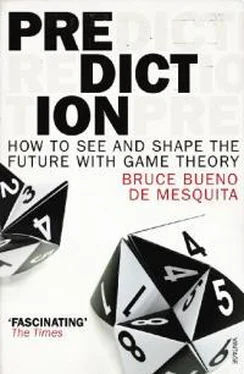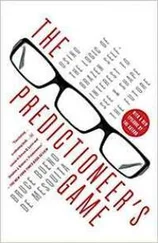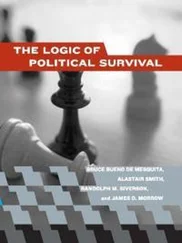Prediction with game theory requires learning how to think strategically about other people’s problems the way you think about your own, and it means empathizing with how others think about the same problems. A fast laptop and the right software help, but any problem whose outcome depends on many people and involves real or imagined negotiations is susceptible to accurate forecasting drawn from basic methods.
In fact, not only can we learn to look ahead at what is likely to happen, but—and this is far more useful than mere prediction and the visions of seers past and present—we can learn to engineer the future to produce happier outcomes. Sadly, our government, business, and civic leaders rarely take advantage of this possibility. Instead, they rely on wishful thinking and yearn for “wisdom” instead of seeking help from cutting-edge science. In place of analytic tools they count on the ever-present seat of their pants.
We live in a world in which billions—even trillions—of dollars are spent on preparations for war. Yet we spend hardly a penny on improving decision making to determine when or whether our weapons should be used, let alone how we can negotiate successfully. The result: we get bogged down in far-off places with little understanding of why we are there or how to advance our goals, and even less foresight into the roadblocks that will lie in our way. That is no way to run a twenty-first-century government when science can help us do so much better.
Business leaders do no better than their political peers. They spend fortunes doing financial analyses of their expected gains and losses from this or that deal, but they spend virtually nothing analyzing how their counterparts on the other side of the table think about their own gains and losses. The result: companies have a good idea how much a business is worth to them before they try to buy it, but they don’t know how much they need to pay for it. In my experience, they often pay far too much, or, to look at the other side of the coin, they sell for much less than the buyer was prepared to pay. Too bad for their shareholders.
How can anyone make prudent choices without first thinking through how others will see those choices and react to them? Yet that is how most big decisions are made, blind to anyone else’s point of view. Plowing ahead without much thought to what motivates our rivals, whether in business or in government, is a surefire way to make a mess of things, leaving us to muddle through at best, our hopes pinned to shortsighted decisions.
Decision making is the last frontier in which science has been locked out of government and business. We live in a high-tech age with archaic guesswork guiding life and death decisions. The time for peering into tea leaves or reading astrological charts should be long over. We should leave entertaining divinations to storefront psychics and open the door to science as the new basis for the big decisions of our time.
Curious about how this can be done? The chapters to follow explain how precise predictions can be made. We will see, through illustrative examples from the worlds of national security and business and everyday life, that the problems of war and peace, mergers and acquisitions, litigation, legislation, and regulation—and just about anything else that does not rely on the hidden hand of market forces—can be reliably predicted.
We will see ways to use science, mathematics, and, in particular, the power of game theory to sort out behavior and improve the future. I hope to share with you this cutting-edge world of thought, whose potential, to many, may seem to verge on the mystical. But there is no mystery or mysticism in good prediction. To demonstrate this for you, I will suggest, in Chapter One, how a modest amount of strategic reasoning can help you save hundreds and maybe thousands of dollars the next time you buy a car.
1

WHAT WILL IT TAKE TO PUT YOU IN THIS CAR TODAY?
“GAME THEORY” IS a fancy label for a pretty simple idea: that people do what they believe is in their best interest. That means they pay attention to how others might react if they choose to do one thing or another. Those “others” are anyone believed to be a prospective supporter or opponent. Looking at how their interests intersect or collide is basic to assessing potential outcomes of decision making. To get a good grip on what people are likely to do requires first approximating what they believe about the situation and what they want to get out of it. By estimating carefully people’s wants and beliefs, anyone can make a reliable forecast of what each and every one of them will do. And if you can predict what will happen, then you can also predict what will happen if you alter what people believe about a situation. This is, in short, how we can use the same logic both for prediction and for engineering the future.
I’ll provide a more detailed examination of game theory in the next two chapters, but first, as promised, let me illustrate what I’m talking about with the example of how best to buy a new car.
A new car purchase is a costly bargaining experience for most of us because most of us are bad at it. A little strategic reasoning can go a long way to improve the experience. If you follow the ideas here, you will not only have a happier time buying a car, you’ll also pay a lot less money.
New cars are mostly bought in one of two ways. Most of us go to a dealership, test-drive a vehicle, maybe fall in love with it, and engage in a most unpleasant negotiation over the price. A smaller number of us hate that experience enough that we buy cars through the Internet. This usually means getting price bids from a few local dealers and then going to one of them to get the car. That’s slightly better, but there’s yet a better way to buy cars that I urge you to try.
What’s wrong with the most popular means of car shopping? Pretty much everything. To start with, you, the buyer, invest your time, and probably the time of some family members as well, at a car dealership. The salesperson knows that few people enjoy dealing with them. They know that they rate near the bottom of anybody’s scale of occupational trustworthiness. (The Jobs Rated Almanac weights occupations by numerous factors and reports that auto sales ranks 220th out of 250 occupations. 1Apparently it’s worse to be a taxi driver, cowboy, or roustabout, but not by much.) But there you are subjecting yourself to the salesperson’s pitch, standing before a car dealer in his or her place of business, feeling compelled to haggle over the price, probably to your embarrassment and certainly to your disadvantage. The whole time you’re talking to the dealer you’re revealing information that sets you up to pay too much.
Being there is what game theorists call a “costly signal.” It’s a costly signal because your expenditure of time and energy announces that you want to buy, that there’s a good chance you’ll buy from the dealership you’re visiting rather than go elsewhere, and, especially if you have kids with you, that you want to get out of there as quickly as possible. That first step, then, your simply being there , translates into strengthening the salesperson’s hand in getting a good price. They believe you’re ready to buy, and you’ve done precious little to dissuade them. Score one for the dealer, none for you.
Now as it happens, costly signals are usually good things for you. They show you’re serious about what you are saying and doing. That can give you credibility, as we will see in later chapters. Unfortunately, costly signals can have just the opposite effect when you’re a shopper. They announce your eagerness to buy, and that makes it tough to get a good deal.
Читать дальше












